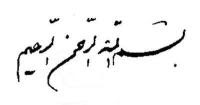 Bismi Rabbi Musa wa Harun
Bismi Rabbi Musa wa HarunThe result of the Ummah's drift from the Prophetic model was seen in the stunning defeat of Muslim armies in the Middle East in June 1967 and in East Pakistan in December 1971. Muslims' illusions of nationalism lay shattered with the burnt-out shells of tanks in the Sinai Peninsula and the paddy fields of what is today called Bangladesh. No matter what excuses are advanced for these disasters - the lack of weaponry or international support and so on - the fact remains that Muslim armies fighting under the banner of nationalism were not only defeated but humiliated. The Muslim world lay in disarray because it had rebelled against the commands of Allah.
It was in those dark days that the Islamic Revolution in Iran came like a flash of lightning on the world scene in 1978. The leadership of Imam Khomeini, a charismatic figure who emerged from the very roots of Islam, struck an instant chord with the Muslim masses worldwide. He had had virtually no contact with the west. In fact he spoke no western languages; Arabic and Persian were his languages of choice. He was very unlike other Muslim leaders of the twentieth century, who took pride in their closeness to the Ummah's greatest enemies. He could not have appeared at a more opportune time: the Ummah yearned for a break in the string of humiliations at the hands of the enemies of Islam, and exulted in the self-confidence and successes of the Muslims in Iran.
Imam Khomeini represented everything that the Muslim masses expect in their leaders: taqwa, modesty, humility, simplicity, courage, charisma, wisdom and firasah (insight) - qualities that do not come without a deep knowledge of Islam invested with profound spirituality. Imam Khomeini was not a political leader; his station was much higher. In the contemporary world, politics has become a dirty word; it is a game played by unscrupulous people for selfish ends. For the Imam, worldly power was not an end in itself but the means to a much higher purpose: to implement Allah's divine laws on earth, the very purpose for which man has been created, and "to enforce the common good and prohibit evil" (al-Qur'an 3:104). As the noble Messenger of Allah, upon whom be peace, has said, anyone given power and authority without seeking them will have Allah's support; those running after positions will be deprived of divine help. The Imam never sought any position; his authority was based on his profound understanding of Islam and the great esteem in which the Muslim masses, especially in Iran, held him.
(The Imam of the Ummah who Restored Muslims’ Hope and Pride – Zafar Bangash, Director of ICIT)
 “Dua minggu sebelum memberi ucapan di Universiti Kaherah pada 4 Jun 2009, Presiden Obama meminta saya menambah beberapa petikan ayat al-Quran sebagai sebahagian daripada teks ucapannya.” kata Dalia Mujahid kepada wartawan Syarq Aswath.
“Dua minggu sebelum memberi ucapan di Universiti Kaherah pada 4 Jun 2009, Presiden Obama meminta saya menambah beberapa petikan ayat al-Quran sebagai sebahagian daripada teks ucapannya.” kata Dalia Mujahid kepada wartawan Syarq Aswath.

